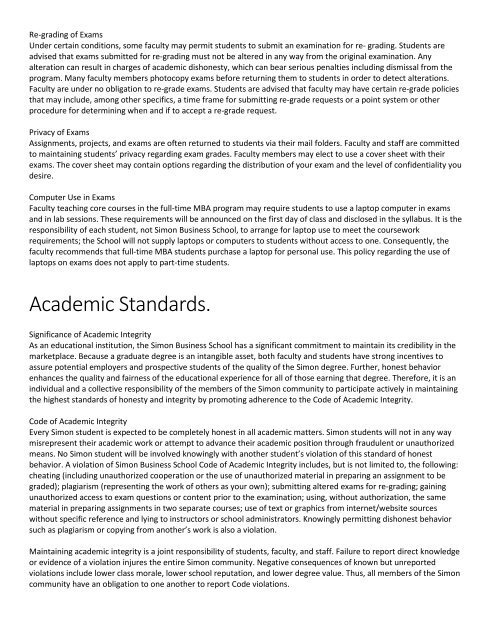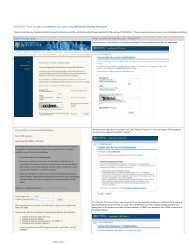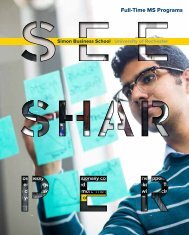mySimon student handbook
You also want an ePaper? Increase the reach of your titles
YUMPU automatically turns print PDFs into web optimized ePapers that Google loves.
Re-grading of Exams<br />
Under certain conditions, some faculty may permit <strong>student</strong>s to submit an examination for re- grading. Students are<br />
advised that exams submitted for re-grading must not be altered in any way from the original examination. Any<br />
alteration can result in charges of academic dishonesty, which can bear serious penalties including dismissal from the<br />
program. Many faculty members photocopy exams before returning them to <strong>student</strong>s in order to detect alterations.<br />
Faculty are under no obligation to re-grade exams. Students are advised that faculty may have certain re-grade policies<br />
that may include, among other specifics, a time frame for submitting re-grade requests or a point system or other<br />
procedure for determining when and if to accept a re-grade request.<br />
Privacy of Exams<br />
Assignments, projects, and exams are often returned to <strong>student</strong>s via their mail folders. Faculty and staff are committed<br />
to maintaining <strong>student</strong>s’ privacy regarding exam grades. Faculty members may elect to use a cover sheet with their<br />
exams. The cover sheet may contain options regarding the distribution of your exam and the level of confidentiality you<br />
desire.<br />
Computer Use in Exams<br />
Faculty teaching core courses in the full-time MBA program may require <strong>student</strong>s to use a laptop computer in exams<br />
and in lab sessions. These requirements will be announced on the first day of class and disclosed in the syllabus. It is the<br />
responsibility of each <strong>student</strong>, not Simon Business School, to arrange for laptop use to meet the coursework<br />
requirements; the School will not supply laptops or computers to <strong>student</strong>s without access to one. Consequently, the<br />
faculty recommends that full-time MBA <strong>student</strong>s purchase a laptop for personal use. This policy regarding the use of<br />
laptops on exams does not apply to part-time <strong>student</strong>s.<br />
Academic Standards.<br />
Significance of Academic Integrity<br />
As an educational institution, the Simon Business School has a significant commitment to maintain its credibility in the<br />
marketplace. Because a graduate degree is an intangible asset, both faculty and <strong>student</strong>s have strong incentives to<br />
assure potential employers and prospective <strong>student</strong>s of the quality of the Simon degree. Further, honest behavior<br />
enhances the quality and fairness of the educational experience for all of those earning that degree. Therefore, it is an<br />
individual and a collective responsibility of the members of the Simon community to participate actively in maintaining<br />
the highest standards of honesty and integrity by promoting adherence to the Code of Academic Integrity.<br />
Code of Academic Integrity<br />
Every Simon <strong>student</strong> is expected to be completely honest in all academic matters. Simon <strong>student</strong>s will not in any way<br />
misrepresent their academic work or attempt to advance their academic position through fraudulent or unauthorized<br />
means. No Simon <strong>student</strong> will be involved knowingly with another <strong>student</strong>’s violation of this standard of honest<br />
behavior. A violation of Simon Business School Code of Academic Integrity includes, but is not limited to, the following:<br />
cheating (including unauthorized cooperation or the use of unauthorized material in preparing an assignment to be<br />
graded); plagiarism (representing the work of others as your own); submitting altered exams for re-grading; gaining<br />
unauthorized access to exam questions or content prior to the examination; using, without authorization, the same<br />
material in preparing assignments in two separate courses; use of text or graphics from internet/website sources<br />
without specific reference and lying to instructors or school administrators. Knowingly permitting dishonest behavior<br />
such as plagiarism or copying from another’s work is also a violation.<br />
Maintaining academic integrity is a joint responsibility of <strong>student</strong>s, faculty, and staff. Failure to report direct knowledge<br />
or evidence of a violation injures the entire Simon community. Negative consequences of known but unreported<br />
violations include lower class morale, lower school reputation, and lower degree value. Thus, all members of the Simon<br />
community have an obligation to one another to report Code violations.




